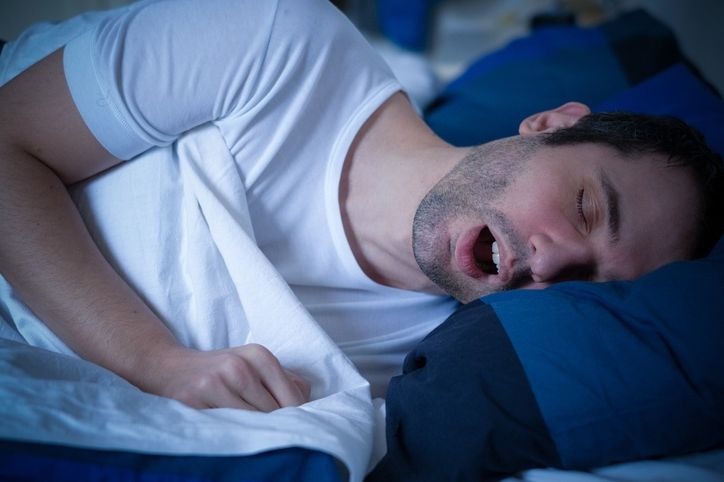Sleep apnea : how to breathe better at night?
Caution : You must consult your doctor for your health. This page presents only a personal and alternative point of view which should not be considered as an attempt to prescribe medicine.
Sleep apnea is a syndrome that is characterized by involuntary stops in breathing during sleep.
These respiratory stops can occur several times and can last from 10 to 30 seconds.
These sleep disorders can subsequently have serious consequences on the health of the affected person.

Fortunately, with a few tips, you can easily breathe better at night!
What are the factors that promote sleep apnea?
Sleep apnea is often caused by blocking the passage of air during breathing.
One of the major factors that promote this phenomenon is the relaxation of the tongue and throat muscles.
This relaxation is in fact due to the lack of tone of the throat muscles.
Thus, the person tries to breathe, but they cannot because the air circulation path is blocked.
This relaxation is more accentuated in the elderly whose muscles are not toned enough.
Overweight (obese) people are also very affected by this syndrome.
In the latter, sleep apnea is due to excess fat in their neck, which blocks breathing.
In addition, apneas can be caused by dysfunction of the brain.
This type of apnea is much more common in people with a serious condition, such as heart or neurological disease, for example.
The consumption of narcotics or alcohol is also a predisposing factor to sleep apnea.
How to recognize sleep apnea?
Sleep apnea can be recognized by several signs.
People with this ailment often tend to snore at night.
That said, there are people who snore naturally without being prone to apnea.
However, the majority of people who have this syndrome suffer from chronic snoring.
NOTE: Snoring is a respiratory problem that should not be taken lightly because it prevents you from getting a restful night's sleep.
With snoring, therefore, breathing stops or pauses often follow.
These pauses in the breathing rhythm can be numerous and have variable durations.
The person's sleep will be fragmented or even, restless followed by sweating.
This syndrome can also cause fatigue upon waking up.
This fatigue is usually accompanied by drowsiness, which is a sign that the person has not slept well following it.
Other signs can also alert.
These include, for example, concentration difficulties and memory disorders.
Over time, if sleep apnea is not treated quickly, it can have serious health consequences.
It can promote diseases like stroke, hypertension, heart attack or cardiac arrhythmia.
In these cases, the risk of death during sleep is very high.
Lack of sleep can also lead to depression, as well as accidents at work or on the road.
How to breathe well at night to avoid blocking your breathing?
There are many tips to help you breathe better while you sleep.
Sleep on your side
When you have apnea, you should avoid sleeping on your back.
The correct position is to sleep on your side.
To avoid rolling over onto your back, you can use pillows to keep you in your position.
To make it easier, there are special pillows that can help you.
Keep your nasal passages open
Another tip is to make sure that your nasal passages are not blocked.
They must therefore always be kept open, this will avoid triggering apnea.
For this, you can take products that will allow you to decongest your nasal passages.
Salt water will be more than enough to unclog your nostrils.
In addition, there are other products that are also effective against obstruction of the nasal passages such as alkaline solutions.
These products, like physiological serum, can help you breathe better through your nose at night.
There are also devices to keep the back of your mouth open during sleep.
These are placed in the mouth and prevent the lower jaw and tongue from obstructing the nasal passages.
To find out if these devices will help you, you should talk to your doctor.
Change your lifestyle
Changing your lifestyle is also an option to treat sleep apnea.
For this, you should avoid smoking or drinking alcohol.
This is because alcohol decreases the amount of oxygen available in your blood.
It is therefore not recommended to take it before going to bed.
For overweight people, it is necessary to play sports and control your diet in order to lose belly and more particularly abdominal fat, which all people with sleep apnea have in common.
Identify all the causes of your breathing pause at night, so you know what to do, because sleep apnea is a syndrome that should not be taken lightly.
With a few good practices, you can breathe better at night.
An unprecedented solution to overcome sleep apnea
As a respiratory coach, I have met many people with sleep apnea.
What I have observed is simple: all of these people have very low cellular oxygenation.
When we know how the body works, we know that this low oxygenation is caused by a low concentration of CO2.
Indeed, your cells get oxygenated thanks to the Bohr effect (CO2 attracts oxygen).
So the natural solution is to increase your CO2 level in the body in order to automatically increase your oxygen level.
To boost your CO2 concentration, without going as far as hypercapnia with too much CO2, there are very simple solutions:
1) do more sport during the day (slow to moderate pace, the idea is to be active and eliminate a sedentary lifestyle)
2) eat more protein and less carbohydrates (proteins produce more CO2 than carbohydrates)
3) avoid poisons (industrial sugar, table salt, cooking oil, alcohol, cigarettes, etc.)
4) practice the Intermittent Breathing technique during the day.
As bizarre as it may be, doing breathing apneas (in a very specific way as outlined in the training), helps to cancel breathing apneas at night.
You have to test to believe it.
❤ The ultimate guide to breathing
Intermittent Breathing : Discover the method to quickly relieve your anxiety and chronic fatigue (positive effects from the first use).Read also :
Previous article : Asthma : how to breathe when your bronchi are blocked ?
Next article : Allergies and difficulty in breathing : what solutions?

